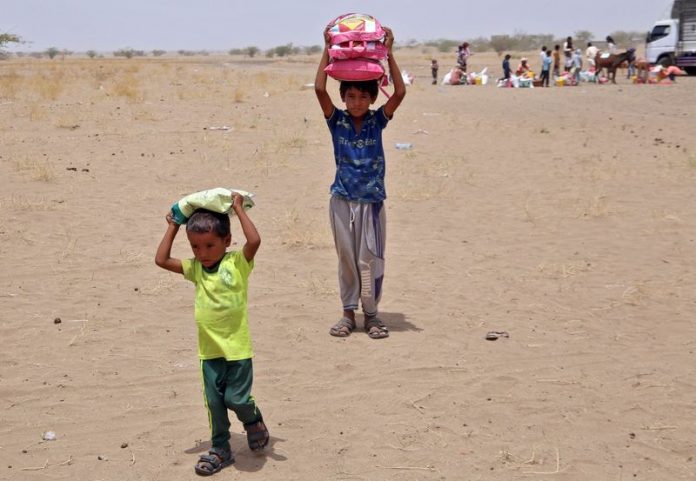The continent’s leaders have largely been reluctant to push back against Moscow, but their fence-sitting hasn’t spared them from the invasion’s fallout.
At the start of Russia’s invasion of Ukraine, the most powerful condemnation of Vladimir Putin’s adventurism came from an African. In a speech that went viral worldwide, Martin Kimani, Kenya’s ambassador to the United Nations, invoked Africa’s traumatic colonial experience to condemn the Russian leader’s imperial revanchism. “[African states] rejected irredentism and expansionism on any basis, including racial, ethnic, religious or cultural factors,” he said. “We reject it again today.”
Since then, however, African criticism of Russia has been muted, especially in the UN, where the continent’s 54 votes can swing resolutions. Barely more than half of the African states voted for the March 2 UN resolution condemning the invasion; 17 abstained, eight chose not to vote at all. Eritrea — along with Belarus, North Korea, Syria and Russia itself — voted against. Despite diplomatic efforts by the U.S. and its allies to rally African opinion against Russia, more countries have climbed onto the fence: 33 either abstained or didn’t vote in an April 7 resolution to suspend Russia from the UN’s human rights council.
The reasons for the reluctance to censure Russia range from the historic to the pragmatic. The colonial past Kimani cited informs a widespread wariness toward exhortations from the West. Gauzy memories of Soviet support for newly independent African states in the 1960s and 70s encourage a certain amount of sympathy for Moscow.
The more recent deepening of economic relations plays a role, too: Although Russia is no longer a significant contributor of development aid for Africa, and only a minor source of direct investment, it has become a major supplier of food and, especially in the past few years, an increasingly important provider of military assistance.
But these ties now put Africa in a bind. The refusal to take a position not only represents a moral hazard, it provides no protection from the repercussions of war. African nations are already hurting economically as a direct consequence of Russia’s invasion of Ukraine; political pain will inevitably follow.
The war has cut off Africa from two major sources of grain. According to the Food and Agriculture Organization, 14 African nations depend on Russia and Ukraine for half their wheat, with Eritrea (100%), Somalia (over 90%) and Egypt (nearly 75%) topping the list. Overall, wheat imports make up 90% of Africa’s $4 billion trade with Russia and almost 50% of its $4.5 billion trade with Ukraine, according to the African Development Bank. In an interview with Al Jazeera, the bank’s president, Akinwumi Adesina, warned of a growing food crisis that could “destabilize the continent.”
In addition to crimping wheat supplies, the war has caused a price surge in a wide range of commodities, sending inflation soaring even as nations struggle to recover from two years of economic suffering caused by the coronavirus pandemic. This poses a threat to governments throughout the developing world, but especially in Africa, which is already experiencing a democratic retrenchment and a resurgence of military coups.
The war is also drawing the developed world’s attention to Ukraine, making it all but impossible for African nations to get the additional assistance that they desperately need. Unsurprisingly, economists who cover Africa at the World Bank are predicting more civil unrest to come.
It is the utmost of ironies that the prospect of civil unrest, itself the consequence of Russia’s actions elsewhere, will boost African demand for Russian services of another kind. For many governments, the munitions and manpower provided by Moscow are the very tools they need to suppress political dissent and beat down a restive population.
The most potent of these weapons are the mercenaries of the Wagner Group, the Kremlin’s notorious private army-for-hire. Having first emerged in 2014 as an auxiliary of the Russian military during the annexation of Crimea, the organization has become an instrument of Putin’s outreach to despots and autocrats across Africa. Wagner is run by Yevgeny Prigozhin, a businessman with close links to Putin.
Russian mercenaries, most of them military veterans, have for several years fought for the rebel general Khalifa Haftar in Libya and propped up the government in the Central African Republic. More recently, Wagner fighters have popped up in Mozambique, Sudan, Madagascar and Mali. (The group is also active in Syria.)
The withdrawal of French forces from the fight against jihadist groups in the Sahel — the belt of countries just south of the Sahara — represents more opportunity for Prigozhin, especially since many of those countries are now run by military juntas. Wagner fighters have not always been successful against terrorists: In Mozambique, for instance, the Russian contractors fled in the face of sustained attacks from Islamist militias. But the Wagner fighters’ propensity for extreme violence and disregard for the rules of war — never mind such niceties as human rights — makes them attractive to regimes seeking to stamp out political resistance. In payment, Prigozhin is happy to accept rights to exploit minerals, such as gold in Sudan.
Putin’s war represents both a short-term challenge and a long-term opportunity for Wagner. It has been obliged to dispatch fighters from Africa to Ukraine, and will struggle to cope with any increase in demand from African states. But Prigozhin will also be able to recruit from the ranks of battle-hardened Russian soldiers.
African countries may sit on the fence over the war in Ukraine, but they will be its victims for years to come.






























